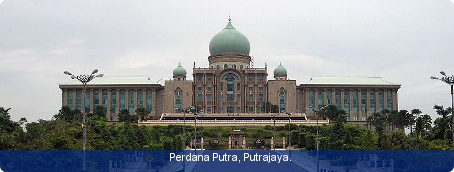Government
- Overview
- History

Malaysia is a parliamentary democracy with a federal constitutional monarchy. The Paramount Ruler, commonly referred to as the Yang di-Pertuan Agong, is the head of state as well as the leader of the Islamic faith in Malaysia. This monarch is selected for a five-year term from among their own number by the nine hereditary rulers (sultans) of Peninsular Malaysia.
The four Malaysian states that do not have hereditary rulers – Melaka and Pulau Pinang in Peninsular Malaysia and Sabah and Sarawak in East Malaysia – have governors and do not participate in the selection of the Yang di-Pertuan Agong. These governors are appointed by the Yang di-PertuanAgong for a four-year term.
Legislative power is divided between federal and state legislatures.
Federal legislative power is vested in the government and the two chambers of the federal parliament. This parliament consists of two houses, the senate (Dewan Negara) and the Hall of the People (Dewan Rakyat). Bills must be passed by both houses and assented by the Yang di-pertuan Agong.
The senate has 70 members; 26 are elected by the 13 state assemblies and 44 are appointed by the monarch. The 222 members of the Hall of the People are elected from single-member districts by universal suffrage for a maximum of five years. The monarch may dissolve parliament at any time, usually on the advice of the prime minister, and elections must follow within three months.
The federal government holds various portfolios including external affairs, defence, internal security, civil and criminal law, citizenship, finance, industry, health and education. The federal government may also make laws to promote the uniformity of the laws of two or more states and it may legislate on any subject at the request of a state legislative assembly.
Executive power lies in the cabinet led by the prime minister who must be a member of the lower house and command a majority. The cabinet is chosen from members of both houses of parliament.The prime minister of Malaysia is appointed by the Yang di-pertuan Agong who also appoints the cabinet on the advice of the prime minister.
Each of the 13 states has its own constitution which must be compatible with the federal constitution. Each state has an executive council, which deals with non-federal matters under a Menteri Besar (chief minister), answerable to elected state assemblies.
Malaysia has two constituencies of law. One is for the entire nation and is set by parliament and requires two-thirds majority to amend. The second is syariah or Islamic law which applies to Muslims. The states normally determine syariah.
A justice system originally based on the British one operates in tandem with Sharia courts. The Federal Court is the supreme court; it is the final court of appeal, and it has exclusive jurisdiction in constitutional matters and in issues arising between states or between the federal government and the states. Appeals arising from the High Courts come before the Court of Appeal.
Sessions courts and magistrates’ courts are located in the main cities and towns throughout the country. The sessions courts are presided over by a judge and have limited jurisdiction in civil and criminal cases. The magistrates’ courts also hear civil and criminal cases, with more limited jurisdiction. All judges are appointed by the monarch on the advice of the prime minister, and magistrates by the state authority on the advice of the chief judge.

In the late eighteenth and nineteenth centuries, Britain created colonies and protectorates in the area of present-day Malaysia.
Reaction to colonial rule commenced in the early twentieth century. In 1931 the Malayan Communist Party (MCP) was formed. By the outbreak of the Second World War anti-colonial nationalism had begun to be felt among the Malay community; the formation of the Union of Young Malays was one manifestation of this. Between 1941 and 1945 the country came under Japanese occupation. When British rule was reintroduced at the end of the Second World War, it met active resistance. The United Malays’ National Organisation (UMNO), the principal Malay party, was formed in 1946.
In 1948, the British-ruled territories on the Malay Peninsula except Singapore became the Federation of Malaya, which achieved independence in 1957. The formation of Malaysia took place six years later when the erstwhile British colonies of Singapore, Sabah and Sarawak entered the federation. In 1965, by mutual agreement, Singapore left the federation and became an independent state.
The National Front (Barisan Nasional) – a multi-ethnic alliance led by UMNO –won more than two-thirds of seats at all elections between the 1970s and the early twenty-first century. In the 2008 elections, the ruling National Front faced a united opposition at both national and state levels. Although it won in seven of the 12 states contested and took 140 of the 222 seats in the federal parliament, it was the National Front’s worst performance since 1969.
In 2008 three opposition parties that had worked together in the election, the Democratic Action Party (DAP), the Pan-Malaysian Islamic Party (PAS) and the People’s Justice Party formed a coalition, Pakatan Rakyat. The former deputy prime minister Anwar Ibrahim became leader of Pakatan Rakyat.
The Sultan of Kedah, Tuanku Abdul Halim Mu’adzam Shah, who had previously reigned in the first half of the 1970s, was chosen as Yang di-Pertuan Agong in December 2011.





